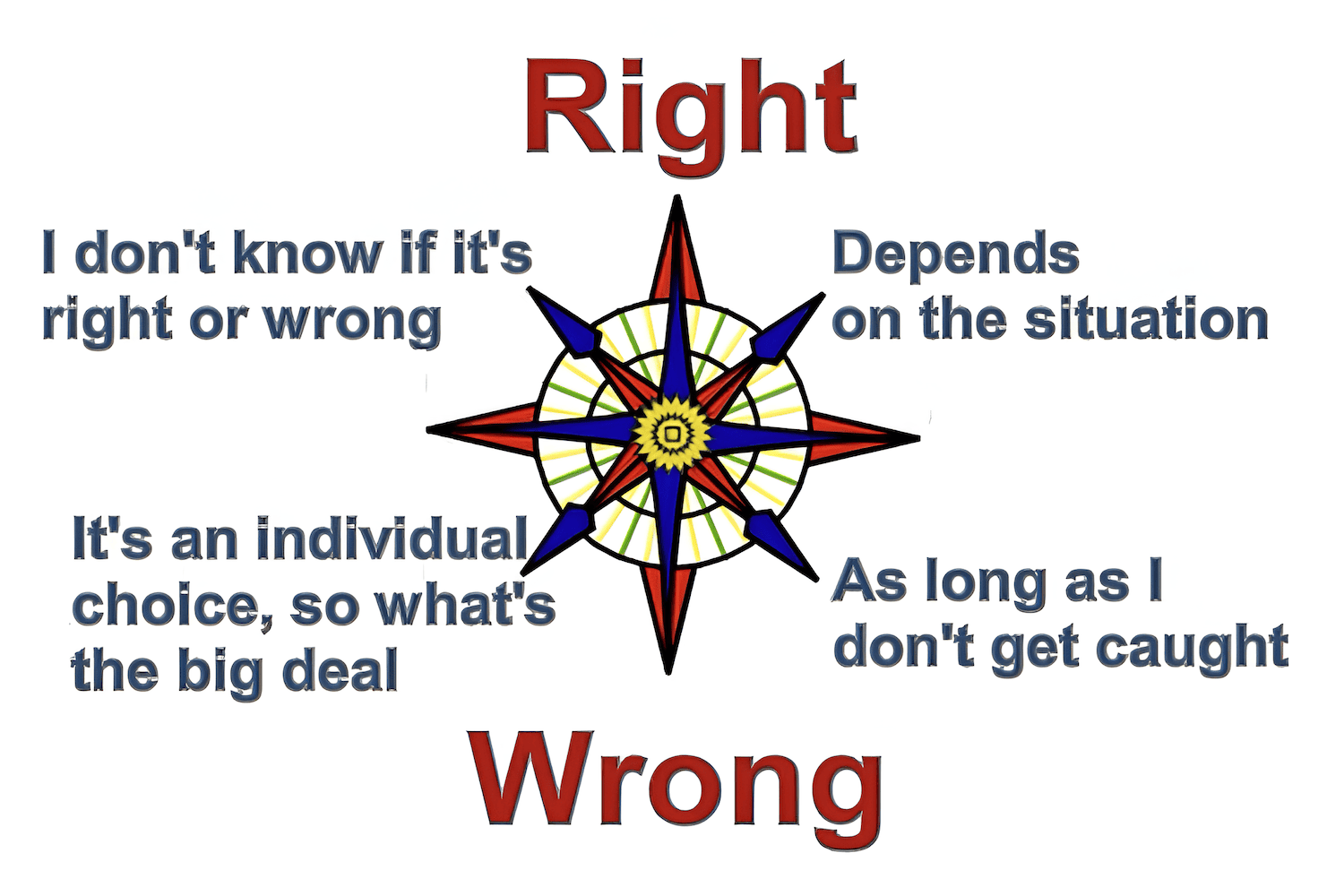Grace plays a crucial role in shaping your moral compass, influencing how you navigate ethical dilemmas and treat others. It encourages a more nuanced and compassionate approach to morality, one that goes beyond rigid rules and allows for context and human complexity.
This grace-centered morality doesn't require compromising your principles or excusing harmful behavior. Instead, it enriches your ethical framework with compassion and wisdom. It acknowledges that people are complex, situations are often layered, and everyone has the potential for growth and change.
A moral compass guided by grace encourages you to look beyond surface actions and consider the deeper motivations and circumstances. It invites you to ask, "What led to this situation?" and "How can healing and growth take place?" rather than rushing to judgment or punishment. This thoughtful approach fosters more just and compassionate decisions, while promoting a society that prioritizes rehabilitation and personal development over retribution.
The Absence of Grace: Imagining a Merciless Society
Picture a world devoid of grace – a stark, unforgiving landscape where every mistake is met with maximum punishment, where forgiveness is seen as weakness, and where compassion is a foreign concept. In this graceless society, your worth is solely determined by your latest achievement or failure, with no room for redemption or second chances.
In such a world:
- Relationships would be fragile and superficial, as any misstep could lead to immediate rejection
- Innovation and creativity would be stifled, as the fear of failure would paralyze risk-taking
- Mental health issues would skyrocket, with perfectionism and anxiety becoming the norm
- The justice system would be purely punitive, with no concept of rehabilitation
- Social mobility would be nearly impossible, as past mistakes would permanently define individuals
The absence of grace would create a society marked by fear, distrust, and isolation. You would constantly be on guard, afraid to show any vulnerability or admit any weakness. The pressure to be perfect would be overwhelming, leading to a culture of pretense and inauthenticity.
Without grace, the concept of growth and personal development would be severely limited. Mistakes, instead of being valuable learning opportunities, would become career-ending, relationship-destroying events. This would lead to a stagnant society, where people are too afraid to try new things or push boundaries. The loss of grace would not only affect individual lives but would also hinder social progress and innovation on a broader scale.
Rediscovering the Value of Grace: A thought Experiment
To truly appreciate the value of grace, let's engage in a thought experiment. Imagine that for one week, you live in a world where grace has been completely removed. Every interaction, decision, and outcome is based solely on merit, with no allowance for mistakes or second chances.
Day 1: You oversleep and arrive late to work. Instead of understanding, you're immediately fired with no opportunity to explain or make amends.
Day 2: You forget a friend's birthday. They end the friendship on the spot, unwilling to forgive this lapse in memory.
Day 3: You make a minor error in a project. Your entire team criticizes you harshly, with no consideration for your overall track record or the pressure you were under.
Day 4: You accidentally bump into someone on the street. Instead of a simple "no problem," you face angry accusations and threats of legal action.
Day 5: You struggle to understand a new concept at a glass you're taking. The instructor, instead of offering patience and alternative explanations, asks you to leave, stating you're not cut out for the subject.
By the end of this grace-less week, you'd likely feel exhausted, demoralized, and isolated. This experiment highlights how grace acts as a social lubricant, making our interactions smoother and more forgiving. It shows that without grace, even minor infractions can have devastating consequences, making life incredibly stressful and unforgiving.
Now, imagine the relief and gratitude you'd feel when grace is restored. You'd likely have a newfound appreciation for the second chances, understanding nods, and forgiving smiles that grace provides in your daily life. This thought experiment serves as a powerful reminder of how essential grace is to our individual well-being and to the functioning of a compassionate society.
Cultivating Grace in our Daily Lives
Having recognized the vital role of grace, the question becomes: how can you cultivate more grace in your daily life? Embracing grace is not just about receiving it, but also about extending it to others and to yourself. Here are some practical ways to incorporate more grace into your everyday interactions:
- Treat yourself with the same kindness you'd offer a good friend
- Acknowledge that making mistakes is part of being human
- Use positive self-talk to counter harsh self-criticism
- Let go of grudges, recognizing that holding onto anger hurts you more than others
- Try to understand others' perspectives, even when they've wronged you
- Remember times when you've been forgiven and pay it forward
- Take deep breaths when you feel frustration rising
- Remind yourself that everyone is fighting their own battles
- Practice active listening to understand rather than to respond
- Regularly express gratitude for the grace others show you
- Acknowledge the efforts of others, even when the results aren't perfect
- Create a gratitude journal to remind yourself of the grace in your life
- Be willing to give others the opportunity to learn and grow from their mistakes
- Don't define people by their worst moments
- Look for the potential in others, not just their past actions
By consistently practicing these habits, you'll not only become more gracious yourself but also inspire others to do the same. Remember, cultivating grace is an ongoing process that requires patience and persistence. As you become more aware of opportunities to show grace, you'll find that it becomes an integral part of your character, transforming your relationships and your perspective on life.
The Transformative Power of Grace
Grace has the remarkable ability to transform individuals, relationships, and entire communities. Its power lies in its capacity to break cycles of negativity, heal wounds, and inspire positive change. When you experience or extend grace, you set in motion a series of transformations that can have far-reaching effects.
On a personal level, grace can:
- Liberate you from the burden of perfectionism and self-criticism
- Encourage personal growth by providing a safe space for learning from mistakes
- Foster resilience by showing that setbacks are not final
- Increase your capacity for empathy and understanding
- Enhance your overall well-being and life satisfaction
In relationships, grace acts as a powerful bonding agent. It can:
- Deepen trust and intimacy by creating a non-judgmental environment
- Resolve conflicts more effectively by prioritizing understanding over being right
- Strengthen connections by allowing for vulnerability and authenticity
- Create a positive cycle of mutual support and forgiveness
On a broader societal level, a culture of grace can lead to:
- More effective rehabilitation in the justice system
- Increased social cohesion and reduced polarization
- Greater innovation and risk-taking in business and technology
- Improved mental health outcomes across communities
- More compassionate and effective leadership in various sectors
The transformative power of grace lies in its ability to see beyond current circumstances to the potential for change and growth. It's a force that believes in second chances, in the inherent worth of every individual, and in the possibility of redemption. By embracing and extending grace, you become an agent of positive transformation in your own life and in the world around you.
As you reflect on the transformative power of grace, consider how you can be a catalyst for this positive change in your sphere of influence. Whether it's in your family, workplace, or community, small acts of grace can create ripple effects that lead to significant transformations over time.
Take a moment to reflect on how grace has impacted your life. Can you think of a time when someone extended unexpected kindness or forgiveness to you? How did it make you feel, and how did it change your perspective? Now, consider how you can pay that grace forward. Challenge yourself to consciously extend grace to someone in your life this week – perhaps forgiving a mistake, offering a second chance, or showing unexpected kindness. By doing so, you'll not only transform your own experience but also contribute to creating a more compassionate and understanding world around you.
Imagining a world without grace serves as a powerful reminder of its essential role in our lives. Grace softens the harsh edges of our world, provides opportunities for growth and redemption, and fosters a more compassionate and understanding society. By cultivating grace in our daily lives and recognizing its transformative power, we can create positive change on both personal and societal levels. Remember, in a world that often seems unforgiving, your choice to extend grace can be a revolutionary act of kindness that ripples out to touch countless lives.


